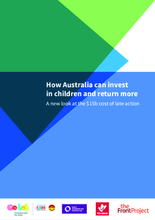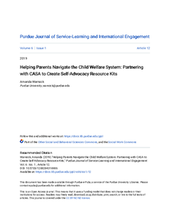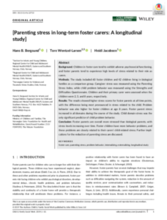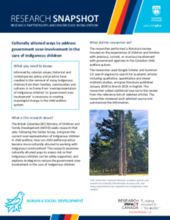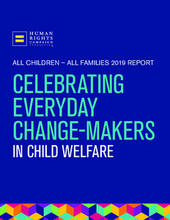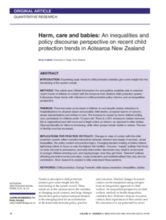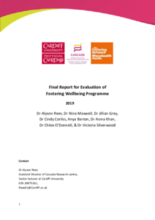Displaying 991 - 1000 of 2221
Through systematic and strategic searches, the authors explored the existing trends of Family Group Conference (FGC) research in indigenous contexts.
This study aimed to explore the psychometric properties of the BERRI in its current form for use with Looked After Children (LAC) in residential care and to explore whether these properties might be enhanced through the extraction of factors.
The purpose of this report is to: reveal how much Australian governments spend every year because children and young people have reached crisis point and highlight the opportunity of earlier and wiser investment in children to improve the lives of young Australians while reducing pressure on government budgets.
The goal of this paper is to describe a pilot effort to provide empirically sound self-advocacy resource kits to parents in the child welfare system in one Indiana county in the United States, in partnership with the organization that aims to advocate for the best interests of children at the center of these cases—Court Appointed Special Advocates (CASA).
The study included 60 foster children and 42 children living in biological families as a comparison group. Caregiver stress was measured using the Parenting Stress Index, while child problem behavior was measured using the Strengths and Difficulties Questionnaire.
This snapshot provides a brief overview of research examining culturally attuned ways to assess risk so that Indigenous children in Australia can be safely supported.
This open access article explores three related phenomena: first, the abandonment and institutionalization of children with disabilities in China that increased disproportionately in the 2000s; second, the important relationships between such abandonments, culture, economics, and politics in contemporary China; and third, the relationship between such abandonments, the increasing rates at which Chinese orphans with disabilities are being adopted to Western countries through Inter-country Adoption (ICA), and the global politics of ICA and disability.
This report highlights more than 70 child welfare agencies across the United States that partnered with the Human Rights Campaign Foundation’s All Children - All Families project to improve the services they provide to the LGBTQ community, including children in foster care and prospective foster and adoptive parents.
This article uses Official Information Act and publicly available data to examine recent trends of children in contact with the Aotearoa New Zealand child protection system. It discusses these trends with reference to child protection policy reforms, and an inequalities perspective.
This report presents findings and recommendations from an evaluation of the Fostering Wellbeing pilot initiative devised by The Fostering Network that was trialled in Cwm Taf, Wales.

